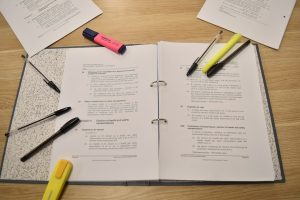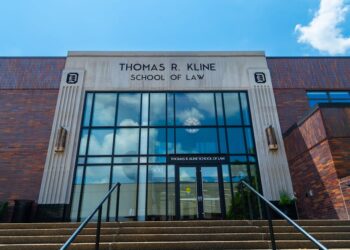No products in the cart.
5 Study Habits That Help in Both Exams and Careers
Discover five study habits that enhance academic performance and career readiness, including spaced repetition and active recall, to prepare for exams and future success.
Mastering the Art of Learning: Essential Study Habits for Career Success
As the landscape of education and the job market evolves, students and young professionals alike are increasingly recognizing the importance of effective study habits. In a fast-paced world where knowledge is power, mastering the art of learning can significantly enhance both academic performance and career success.
Informed by current educational research, five study habits stand out for their proven effectiveness: spaced repetition, active recall, note synthesis, deliberate practice, and reflection routines. These techniques not only prepare students for exams but also equip them with the skills needed to thrive in their future careers.

The Power of Spaced Repetition
Spaced repetition is a technique that involves reviewing material over increasing intervals of time. According to cognitive psychology, this method capitalizes on the brain’s natural forgetting curve, allowing for better retention of information. Many educational platforms, such as Anki and Quizlet, have integrated this technique into their study tools, making it easier for learners to adopt.
Proponents argue that by revisiting material at strategically spaced intervals, students can enhance their long-term memory. In the workplace, this translates to a more profound understanding of complex concepts, enabling professionals to apply their knowledge effectively in real-world scenarios.
Active Recall: Engaging the Mind
 Featured
FeaturedNavigating the Path to Civil Services: A Comprehensive Guide
Unlock your potential in civil services with this comprehensive guide on UPSC preparation strategies and resources.
Read More →Active recall is another effective study method, which involves actively stimulating memory during the learning process. Instead of passively reviewing notes, learners are encouraged to retrieve information from memory. This approach has been shown to strengthen neural connections, making it easier to recall information when needed.
In the workplace, this translates to a more profound understanding of complex concepts, enabling professionals to apply their knowledge effectively in real-world scenarios.
Critics of passive study techniques argue that reading and highlighting do not engage the brain sufficiently. By contrast, active recall methods, such as self-quizzing or flashcards, can lead to better retention rates and prepare students for the dynamic challenges of the workplace.
Note Synthesis: Making Connections
Note synthesis involves combining information from various sources to create a cohesive understanding of a topic. This technique encourages critical thinking and helps students make connections between different concepts. In a professional setting, the ability to synthesize information is invaluable, as it allows for better problem-solving and innovation.
However, some educators emphasize the importance of teaching students how to effectively synthesize notes. Without guidance, learners may struggle to distill essential information from complex subjects, potentially hindering their academic and professional growth.
Deliberate Practice: Refining Skills
Deliberate practice goes beyond repetition; it focuses on improving performance through targeted efforts. This method is particularly relevant in skill-based fields, where honing specific competencies is crucial. Whether it’s coding, writing, or public speaking, deliberate practice encourages individuals to seek feedback and continuously refine their abilities.
 Career Development
Career DevelopmentPreparing for the Future: Skills for 2030 Jobs
Explore the skills and strategies needed to excel in the evolving job market of 2030, ensuring a successful career.
Read More →Many successful professionals attribute their expertise to consistent, focused practice in their chosen fields.
While some argue that deliberate practice is time-consuming, its long-term benefits—such as increased proficiency and confidence—are undeniable. Many successful professionals attribute their expertise to consistent, focused practice in their chosen fields.
Reflection Routines: Learning from Experience
Reflection routines involve taking the time to assess what has been learned and how it can be applied in the future. This habit encourages metacognition, allowing learners to become aware of their thought processes and learning styles. In the workplace, reflective practices can lead to improved decision-making and adaptability.
Yet, the challenge lies in incorporating reflection into daily routines. In an age where speed is often prioritized over depth, finding time for reflection can be difficult. Nevertheless, those who make it a priority often find it leads to more meaningful learning experiences and professional growth.
Looking Ahead: Bridging Education and Employment
As we navigate the complexities of the modern job market, the integration of effective study habits into educational frameworks becomes increasingly essential. Educational institutions are beginning to recognize the significance of equipping students with the skills necessary for lifelong learning.
 Career Development
Career DevelopmentBuilding Professional Confidence: A Systematic Approach
Professional confidence is essential for career advancement. Explore systematic techniques to build and maintain it effectively.
Read More →Employers are also taking notice, often seeking candidates who demonstrate not just knowledge, but the ability to learn and adapt. By fostering these study habits early on, students can bridge the gap between education and employment, paving the way for future success.
Educational institutions are beginning to recognize the significance of equipping students with the skills necessary for lifelong learning.
In a world where continuous learning is paramount, mastering these study habits is not merely beneficial; it is essential. As students and young professionals embrace these techniques, they can look forward to a future where their skills and knowledge are not just relevant, but transformative.











